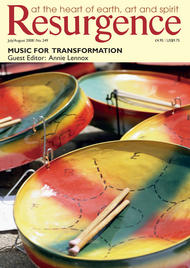OLIVER SACKS IS a world-renowned neurologist and author of The Man Who Mistook His Wife for a Hat and many other books on the vicissitudes of brain function. The cover of his new book promises much: “Music can move us to the heights and depths of emotion… it can lift us out of depression when nothing else can. Indeed, music occupies more areas of our brain than language does – humans are a musical species. Music is irresistible, haunting and unforgettable, and in Musicophilia, Oliver Sacks tells us why.” And he does – from a purely mechanistic and empirical point of view. But for me, he only tells half the story – a fascinating story, nonetheless.
Perhaps my disappointment with this book stems from the title – Musicophilia – which I took to mean ‘The Love of Music’. I was expecting a book that made reference to the emotional and spiritual nature of music, yet what I found was a book that dissected music into its component parts, such that a reductionist perspective was the only one offered. But for me, music is so much more than the sum of its parts.
Sacks has an extraordinary depth of knowledge to draw on from his many years as a clinical neurologist, and some of the case histories he discusses in this book are incredible. For example, the effect music has on sufferers of Parkinson’s disease, in many cases unlocking their ‘frozen’ limbs so that they can move freely again. But once the music stops (even if it is an ‘internal remembering’ of music) the person will fall once again into the abyss of parkinsonism. Or how those suffering from Tourette’s syndrome can harness the percussive nature of their ‘tics’ whilst playing drums to temporarily alleviate them into an enjoyable rhythm.
There is no doubt Sacks is a brilliant physician; he is also an excellent writer: his succinct explanations on music theory (something that could be considered rather dull to the uninitiated) are insightful and, at times, breathtaking, as when he discusses absolute pitch in the chapter entitled ‘Papa Blows His Nose in G’. I’d never given much thought to pitch, but after reading this chapter, I’m convinced that pitch could be considered another ‘sense’ – especially to those who can also tell at how many cycles per second the pitch is oscillating! “To those with absolute pitch, every tone, every key seems qualitatively different, each possessing its own ‘flavour’ or ‘feel’, its own character. Those who have absolute pitch often compare it to colour – they ‘hear’ G-sharpness as instantly and automatically as we ‘see’ blue.” Fascinating stuff, and enough in itself to recommend the book.
But my rub is that all the musical experiences Sacks discusses are ultimately defined either in terms of specific types of brain function (or dysfunction, in the case of those who cannot discern music from the noise of pots and pans being thrown on the floor), or of brain damage. The arguments are convincing, as in the case of the man who was struck by lightning and recovered from the trauma with an insatiable new desire to play the piano. Sacks suggests that neural pathways not formerly available were now accessible to this man, thanks to the electrical ‘bolt from the blue’. Sacks proves his theories about the brain’s ability to perceive music by looking at the brain damage of those who have sadly lost certain abilities. Yet his reasoning left me wanting.
Perhaps, as with all mechanistic explanations, it is because the spiritual aspect is never discussed. Yes: our perception of rhythm can be defined in terms of neurological constructs – but that doesn’t explain the sheer joy of samba, or the ecstasy of salsa! Music is nothing but synaptic chemical reflexes if it doesn’t move the spirit; if it doesn’t touch the soul in some way. And this spiritual quality of music is the one that most of us experience: music is of the body and the spirit. Sacks has chosen not to address the spiritual aspect of music and so I find the book lacking.
All sound is vibration and our bodies are finely tuned instruments that pick up that vibration and translate it into what we hear. Sacks is interested primarily in the instrument, but I want to know why and how that vibration moves us so passionately.
Lorna Howarth is Co-editor of Resurgence.







